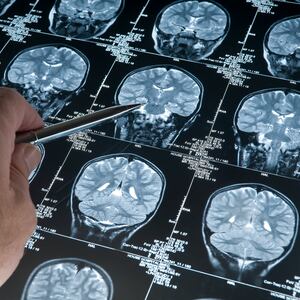Health
Innovative Therapies May Enhance Brain Recovery After Stroke

Recent advances in psychiatric therapies suggest new possibilities for brain recovery following neurological events such as stroke. Dr. Sean Dukelow, a neurologist at Foothills Hospital in Calgary, Canada, has spent the last 15 years treating stroke patients, primarily relying on neurorehabilitation techniques. This method involves repetitive actions through speech, physical, and occupational therapies, which leverage the brain’s inherent plasticity to promote neuron growth and establish new neural connections.
Dr. Dukelow emphasizes the critical role of repetition in recovery, stating, “There’s going to be a lot of repetition.” Currently, options for enhancing long-term recovery remain limited, typically involving invasive procedures like vagus nerve or spinal cord stimulation. However, there is a growing urgency within the medical community to discover substances or devices that can significantly accelerate brain healing.
“That turbo boost may be the difference between you walking again, talking again, being able to get home, versus having to go to a nursing home,” Dukelow explained. This potential for enhanced recovery has led researchers to explore various psychiatric treatments traditionally aimed at conditions such as depression and post-traumatic stress disorder (PTSD).
Exploring Promising Therapeutic Options
Several therapies are emerging as promising candidates in this pursuit. Among them are transcranial magnetic stimulation, antidepressant medications, and psychedelics. These methods are primarily known for their efficacy in treating mental health disorders but are now being considered for their potential to aid in brain recovery.
In the realm of psychiatry, these therapies are believed to engage the brain circuits responsible for memory and learning. These same circuits are thought to be crucial in the recovery process following a stroke. The hope is that by altering established thought patterns and behaviors, these treatments may also enable the brain to devise new strategies for performing essential functions like walking, speaking, and remembering. This could allow patients to bypass damaged neurons and forge new neural pathways.
Research into these therapies is ongoing, and scientists are working to determine whether they can effectively assist in repairing a brain that has suffered damage. The goal is not only to improve mental health but also to facilitate physical recovery, marking a significant shift in how neurological rehabilitation may be approached in the future.
As the field of neurology advances, the intersection of psychiatric treatments and neurological recovery presents a promising frontier. The exploration of these therapies could lead to groundbreaking changes in how stroke recovery is approached, potentially improving the quality of life for countless individuals facing the aftermath of a stroke.
Ongoing studies and clinical trials will be crucial in confirming the efficacy of these innovative treatments. The medical community remains cautiously optimistic about the possibility of these therapies offering a new lease on life for stroke survivors.
-

 World3 months ago
World3 months agoTest Your Knowledge: Take the Herald’s Afternoon Quiz Today
-

 Sports3 months ago
Sports3 months agoPM Faces Backlash from Fans During Netball Trophy Ceremony
-

 Lifestyle3 months ago
Lifestyle3 months agoDunedin Designers Win Top Award at Hokonui Fashion Event
-

 Sports3 months ago
Sports3 months agoLiam Lawson Launches New Era for Racing Bulls with Strong Start
-

 Lifestyle3 months ago
Lifestyle3 months agoDisney Fan Reveals Dress Code Tips for Park Visitors
-

 Health3 months ago
Health3 months agoWalking Faster Offers Major Health Benefits for Older Adults
-

 World3 months ago
World3 months agoCoalition Forms to Preserve Māori Wards in Hawke’s Bay
-

 Politics3 months ago
Politics3 months agoScots Rally with Humor and Music to Protest Trump’s Visit
-

 Top Stories3 months ago
Top Stories3 months agoUK and India Finalize Trade Deal to Boost Economic Ties
-

 Entertainment3 months ago
Entertainment3 months agoExperience the Excitement of ‘Chief of War’ in Oʻahu
-

 World3 months ago
World3 months agoHuntly Begins Water Pipe Flushing to Resolve Brown Water Issue
-

 Science3 months ago
Science3 months agoNew Interactive Map Reveals Wairarapa Valley’s Geological Secrets









